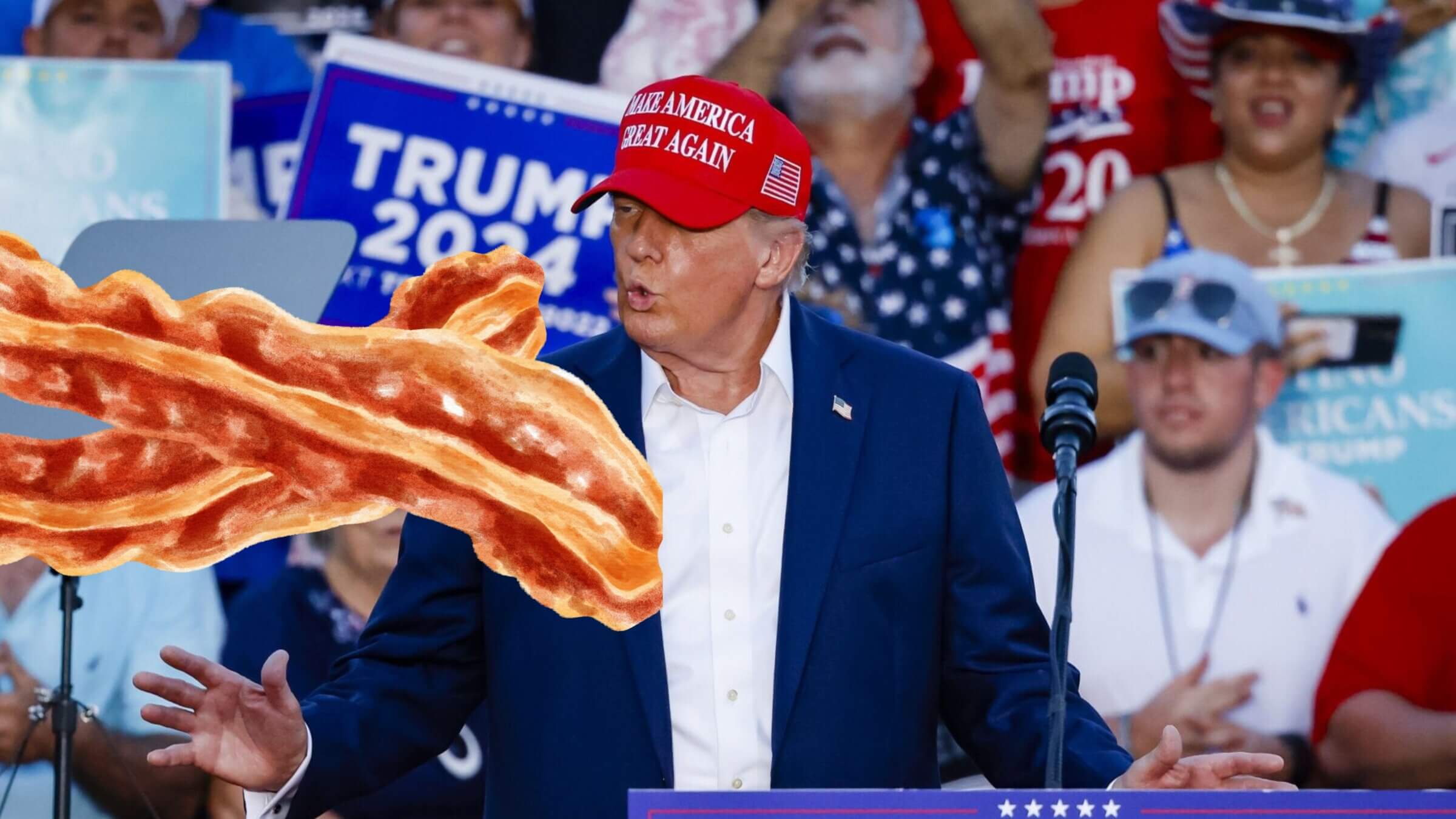Trump’s bacon remark wasn’t kosher, but it may be right
Lamenting the America of old, Trump recently pointed to the jacked up price of a popular pork product

Donald Trump recently kvetched about how Americans no longer eat bacon. Photo-illustration by Canva/Eva Marie Uzcategui/Bloomberg via Getty Images
For a brief but enduring window of time, bacon was the ultimate memeable food.
YouTubers Epic Meal Time crammed greasy strips of pig into every conceivable caloric atrocity they made. The crispy, streaked treat adorned novelty t-shirts, swirled its way into ice cream and effectively conquered the low culinary world. Alas, the culture seems to have moved on, and Donald Trump lamented this development in a recent campaign-stop grievance.
“We don’t eat bacon any more,” Trump said, in Doral, Florida, Tuesday night, blaming this change in eating habits on the rising price of the foodstuff. (Even with his net worth, Trump said he abjured ordering it: “It’s too expensive, I don’t want it.”)
Of course, for many observant Jews and Muslims, bacon was never on the menu. Bacon’s initial popularity was itself simply marketing.
In the 1920s, a Jewish PR consultant named Edward Bernays introduced it as part of an American breakfast in order to increase bacon sales. Bernays was Sigmund Freud’s nephew, so it’s only natural he knew a bit about consumer psychology.
That God forbade pork for the Jews was of little concern in the publicity blitz, and many Jews (myself included) indulge in bacon from time to time, though maybe not as much as in the early aughts.
Trump, while likely wrong to blame President Biden for a 6.9% price hike in bacon this year, is appealing to his base where they feel a change, in a grocery line and at the kitchen table. But beyond inflation — or pork barrel spending — bacon may be losing its glisten among the health conscious, with many upscale restaurants now boasting nitrate-free bacon from meat purveyors like Neuske’s.
The facts don’t bear out a wholesale disinterest in bacon though, with a CNN report attributing the cost in America to demand from overseas and at home, where people are willing to spend more for it. Beyond economics it’s possible Trump was alluding to a more nativist sentiment, though I sorta doubt it.
For all his anti-Muslim legislation and charges of Jewish disloyalty, Trump likely wasn’t dogwhistling to the crowd when he brought up bacon. A subtext where he was saying demographic shifts, and dietary restrictions, clash with the American urge to gorge on pork products is ungenerous. Still, the comments speak to a kind of nostalgia for an America where most people ate pig (or when men were men and not “soy boys”).
That Trump, whose own diet includes McDonald’s, well-done steak with ketchup and Diet Coke, would highlight bacon perhaps indicated an awareness that his average constituents may be the type who still own a “Drink first, pork later” tee and who are now suffering from sticker shock in the meat aisle.
It remains to be seen if Trump, whose new thing has been lauding the wit of the “late, great Hannibal Lecter,” will return once more to the frying pan at upcoming rallies, or if some enterprising MAGA fan will be slinging BLT (Bacon Lettuce and Trump) sandwiches at the RNC.
But the bacon remark is scarcely the strangest evocation of treyf in this election season. Third party candidate Robert F. Kennedy Jr.’s brain parasite was likely a pork tapeworm, proving that sometimes in the topsy-turvy world of presidential politics, pork eats you.





















